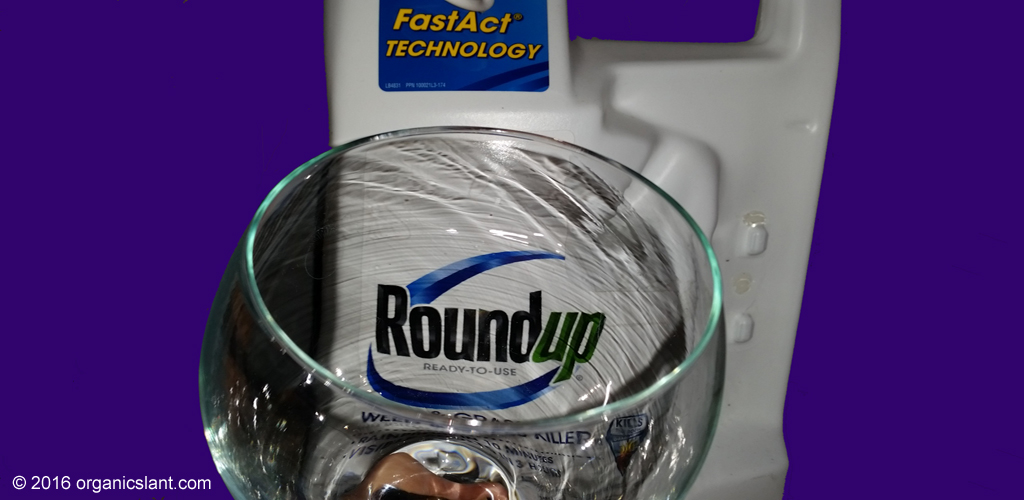Glyphosate is found to contaminate California wines, according to a new report from the non-profit group Moms Across America.
All wines are from the North Coast region of California, the premium wine growing region of California and includes wines from Napa, Sonoma and Mendocino counties. The wines were sent in Sept of 2015 and February of 2016 in two separate groups.
The report finds that all of the ten wines tested positive for glyphosate. The highest level of glyphosate detected was nearly 30 times higher (at 18.74 parts-per-billion, or ppb) than other wines from a 2013 Cabernet Sauvignon sourced from a conventional, chemically farmed vineyard. The lowest level (.659 ppb) was from a biodynamic and organic vineyard, a 2013 Syrah. According to the owner, the vineyard has never been sprayed, indicating the possibility of pesticide drift from conventional agriculture, which has been a real and persistent problem for organic growers. EPA has done little to protect organic growers, who often bear the burden, both economic and otherwise, of pesticides applied to nearby conventional farmlands and vineyards.
The report also points out that “the detection of glyphosate is an indicator of the presence of many other co-formulants in glyphosate-based herbicides, which have recently been shown…to be endocrine hormone disruptors and to be 1000x more toxic than glyphosate alone. Therefore, the type or amount of the co-formulant chemicals in the wines are untested and the consequences on our health are unknown.”
Recent reports of the widespread presence of glyphosate residues find the chemical in breast milk, in nearly 100% of Germans and in German beers, feminine hygiene products, and bread.
Following the carcinogenic classification by International Agency for Research on Cancern (IARC), a research study published in Environmental Health links long-term, ultra-low dose exposure to glyphosate in drinking water to adverse impacts on the health of liver and kidneys. The study focuses on GHBs, rather than pure glyphosate, unlike many of the studies that preceded it. In addition to impacts on human health, glyphosate has been linked to adverse effects on earthworms and other soil biota, as well as shape changes in amphibians. The widespread use of the chemical on genetically engineered (GE) crops has led it to be implicated in the decline of monarch butterflies, whose sole habitat to lay their eggs, milkweed plants, are being devastated as a result of incessant use of glyphosate.
How does glyphosate get into wine? Wouldn’t it kill the vines?
Roundup/glyphosate is sprayed every year in conventional vineyards. A 12 ft strip is sprayed on either side of the grape vines which are planted in rows, to kill weeds when the plants are dormant in late winter or early spring. This results in a 24 foot strip of Roundup sprayed soil with grapevines in the middle.
According to Dr. Don Huber at a talk given at the Acres USA farm conference in December of 2011, the vine stems are inevitably sprayed in this process and the Roundup is likely absorbed through the roots and bark of the vines from where it is translocated into the leaves and grapes.
Roundup/glyphosate cannot be used in organic vineyards so the presence of glyphosate/Roundup in the two wines using organic and biodynamic grapes is obviously unexpected. Since the majority of vineyards in these three counties use Roundup/glyphosate and spray at the same time, it is suspected that airborne drift from nearby vineyards contaminated the organic and biodynamic crops. Glyphosate/Roundup could also appear in organic grape wine from vineyards which were conventionally managed and then converted to organic.
According to several scientific studies glyphosate/Roundup can remain viable in the soil for over 20 years.
The detection of the most widely used herbicide in the world in our wines, especially organic and biodynamic wines which pride themselves on being free of toxic chemicals, is a growing problem for the beverage industry. The contamination of glyphosate and coformulants is a growing challenge for any manufacturer to maintain product purity using GMO and glyphosate based herbicide sprayed ingredients.

 Shocking Glyphosate Levels in Popular Bread: Florida’s Eye-Opening Food Testing Report
Shocking Glyphosate Levels in Popular Bread: Florida’s Eye-Opening Food Testing Report Spray Foam Insulation: Energy Hero or Cancer Culprit?
Spray Foam Insulation: Energy Hero or Cancer Culprit? Blood Sugar Stability the Organic Way: Low-Glycemic Foods and Meal Ideas
Blood Sugar Stability the Organic Way: Low-Glycemic Foods and Meal Ideas How to Build a Fully Organic Pantry on a Budget: Essentials for Beginners
How to Build a Fully Organic Pantry on a Budget: Essentials for Beginners